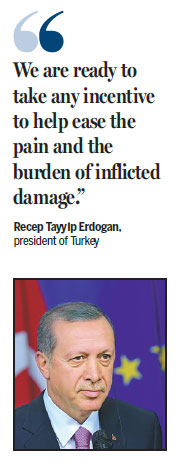Turkey 'sorry' about downing Russian jet
The incident caused a rift between the two countries and led to economic sanctions
Turkey's president has apologized for the downing of a Russian military jet at the Syrian border, the Kremlin said on Monday, an unexpected move that could open the way for easing a bitter strain in Russia-Turkey ties.
Recep Tayyip Erdogan's letter to Russian President Vladimir Putin comes seven months after the incident, which has triggered a slew of Russian sanctions that have dealt a severe blow to the Turkish economy. The formal apology, which the Kremlin had requested, came hours after Turkey and Israel announced details of an agreement to repair their strained relations.
The Kremlin quoted the Turkish leader as offering his condolences to the killed pilot's family and saying: "I'm sorry."
"I share their pain with all my heart," Erdogan said in the letter, according to the Kremlin. "We are ready to take any incentive to help ease the pain and the burden of inflicted damage."
Erdogan's office was keen to describe the letter as an expression of regret, not an apology.
In a speech delivered during a Ramadan fast-breaking dinner in Ankara, Erdogan said he had written to Putin expressing his "regrets" over the incident and reminding the Russian leader of the "potential for regional cooperation".
"I believe that we will leave behind this current situation which is to the detriment of both countries and rapidly normalize our relations," Erdogan said. Erdogan said he believed Ankara would normalize relations with Moscow "rapidly".
Compensation
The Kremlin said on Tuesday that Putin will on Wednesday hold his first phone call with Erdogan since the downing.
Turkish Prime Minister Binali Yildirim on Tuesday went back on an earlier offer of compensation to Russia.
"Compensating Russia is not on the table, we have only expressed our regrets," Yildirim was cited as saying, hours after he said Ankara was ready to offer compensation.
Putin had denounced the downing of the Russian warplane at the Syrian border on Nov 24 as a "treacherous stab in the back". Russia rejected the Turkish claim that the plane had violated its airspace, and responded by deploying long-range air defense missiles to its base in Syria, warning that they would destroy any target posing a threat to Russian aircraft. The plane's downing came amid a rift between Moscow and Ankara over the Syrian conflict.
Moscow moved swiftly to ban the sales of package tours to Turkey, which had depended heavily on the Russian tourist flow; banned most of Turkey's food exports; and introduced restrictions against Turkish construction companies, which had won a sizable niche of the Russian market.
Erdogan had apparently miscalculated the plane incident's fallout for the Turkish economy.
The letter comes at a moment when Ankara's relations with the European Union and the United States have also been strained over the migrant crisis and other disputes. It came on the same day that Turkey and Israel released details of a deal to reappoint ambassadors and end six years of acrimony over Israel's 2010 deadly raid on a Gaza-bound Turkish aid ship.

(China Daily 06/29/2016 page11)














